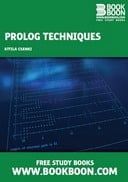
Free Prolog book “Prolog Techniques” in pdf format. The book Prolog Techniques is the first of two volumes by the author on the programming language Prolog and its applications.
Book Description
The second, forthcoming, textbook is entitled Applications of Prolog. In the first volume you can read about the accumulator technique, difference lists, program manipulations and exploratory code development.
Prolog is considered difficult by students. Usually, by the time they learn Prolog, which is most likely to happen in preparation for a course in Artificial Intelligence (AI) or Expert Systems, they will have studied imperative programming and/or the object oriented paradigm.This book is intended to relieve the problem by providing a good collection of programming projects, case studies and exercises of various complexity. It will be useful for three kinds of students.
Table of Contents
- Accumulator Technique
- Difference Lists
- Program Manipulations
- Exploratory Code Development